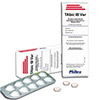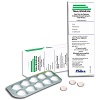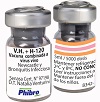
Infectious Bronchitis
Infectious bronchitis is an acute, highly contagious upper respiratory tract disease in chickens. In addition to respiratory signs, decreased egg production and egg quality are common, and nephritis can be caused by some strains. Attenuated live and killed vaccines are available, but different antigenic types of the avian coronavirus causing the disease do not cross-protect, complicating control efforts. Diagnostic tests include ELISA and HI testing for serum antibodies and virus detection by RT-PCR and virus isolation in embryonated eggs. Sequence analysis of the Spike gene is used to genetically type the virus.
Infectious bronchitis virus (IBV) is an avian gammacoronavirus that only causes disease in chickens, although the virus has also been found in pheasants and peafowl, which may be subclinically infected. The virus is worldwide in distribution, and there are many antigenic types that can cocirculate in a given region. Some IBV types are widespread, whereas others are regional.
IBV is shed by infected chickens in respiratory discharges and feces, and it can be spread by aerosol, ingestion of contaminated feed and water, and contact with contaminated equipment and clothing. Naturally infected chickens and those vaccinated with live IBV may shed virus intermittently for up to 20 weeks after infection. The incubation period is generally 24–48 hours, with the peak in excretion of virus from the respiratory tract lasting 3–5 days after infection.









